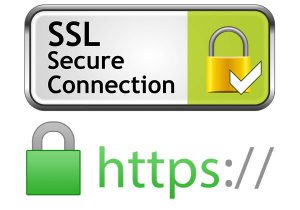When you visit a website, most of the time, the URL will begin with http://. Occasionally, however, it will begin with https://. This additional letter at the beginning of URLs is becoming more common, and that’s a good thing. The difference between the standard http:// and https:// is that the “s” stands for “secure”—this means the data sent between a browser and server is encrypted and thus safer. When a site is secure, you will notice that the very left of the URL bar turns green, has a lock, and states, ‘secure.’
Secure Sockets Layers, better known as SSL, is the global standard of security technology that enables encrypted communication between the web browser and the web server, keeping all information from being intercepted between communication of the browser and server. An SSL is used to secure logins, data transfers, the usage of credit cards and social security numbers on storefronts, government websites, and more. It is utilized both for those using and browsing social media sites.
For instance, when you decide to purchase a new Apple iPhone from the Apple website, you are providing them with your cell phone carrier’s information and log-in, your home information for the shipping address, as well as the billing and shipping information for your credit card. The only way you are able to purchase a phone online without putting yourself at enormous risk is because of SSL. Because of it you have the knowledge, understanding, and comfort that your information is safe, being sent from your computer, into your web browser, and then to the web server of Apple. Without the security of SSL, you are creating an easy pathway for hackers to intercept the communication from the browser to the server (also known as ‘man-in-the-middle-attack’).
The first protocol of SSL was developed in 1994 with the intention to solve increasing concerns regarding both cyber and internet security, and since its birth, https or an SSL certificate has become a website ‘norm.’
Since the inception of the SSL in 1994, the TLS was also birthed. TLS stands for Transport Layer Security, which is the latest version of the original SSL protocol. More recently, SSL and TLS are often grouped together, i.e: SSL/TLS. It is also common for the two terms to be used interchangeably.
Diving deeper into the SSL, an SSL certificate is what authenticates the identity and ownership of a website. This is not just necessary for the peace of mind of the customer/viewer, but also goes to show that you as a website owner are serious about the security of your website and the information of your clientele.
For any business’s website to thrive, gain traction, and build a clientele or viewership, it is necessary for trust to be built — and an easy and simple way to do this is to purchase an SSL certificate.
To find the perfect SSL certificate for your website, check out 101domain. Their certificate options range from personal start-ups and personal websites, to small, medium, and large business websites. This certificate will be recognized by the Certificate authority (CA.) Their prices are set and can be renewed annually.
There are a number of different SSL certificates you can choose from, such as domain validation (DV), organization validation (OV,) and finally, extended validation (EV.)
After you purchase the SSL certificate for your website, the process is not yet complete. You must also direct the flow of traffic from your http website to your new and secured https website. Next, you must add the https version of your website into Google’s Webmaster tool.
Websites who have SSL certificates are ranked with preference from Google. Over 50 percent of Google’s first page search results have SSL certificates — and this percentage is continuously increasing. This certificate has gone from something certain companies use just to earn a few extra brownie points for their website to a necessity required by all companies that want their website to thrive and remain on Google’s immediate search pages.
It has become such a quintessential piece of standard website security that Google Chrome began rolling out penalties in early 2017 for websites and companies alike who did not purchase an SSL certificate. When the user visited a website that was not compliant within Google’s new regulations, Google would send a pop-up to appear within said browser that stated, ‘not secure.’
Since the initial rollout of this feature, Google has implemented even more aggressive notifications to users entering an unsecured website. Google’s end goal is to mark all http pages as ‘not secure,’ hoping these sites will begin to fully convert to https, creating safer internet waves for all.
As of 2019, (and bear in mind that Google holds over 88 percent of market share), it is necessary to obtain an SSL certificate if you want Google to continue to respect and promote traffic to your website.
The post How Does An SSL Certificate Work And Why Do I Need One? appeared first on Young Upstarts.
Startups
via https://aiupnow.com
admin, Khareem Sudlow


